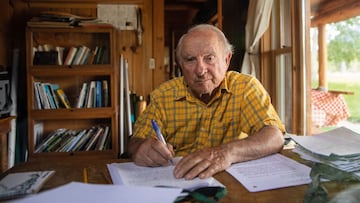Patagonia owner transfers ownership valued at $3 billion to two climate change entities
The 83-year-old founder, Yvon Chouinard, has handed ownership of the company to a charitable trust to aid Patagonia’s environmental mission.

Outdoor sportswear brand Patagonia is undergoing a change of ownership after founder Yvon Chouinard announced that he was giving away the company, in a bid to strengthen the fight against climate change.
Chouinard, a dedicated rock climber and passionate outdoorsman, will transfer control of the global brand over to a uniquely structured trust and a non-profit organisation. Revenue generated by Patagonia’s sales will be used by the trust to fund various planet-saving initiatives.
Upon announcing details of the progressive new venture, the 83-year said that ecological values had always been intrinsically linked to the company:
“As we began to witness the extent of global warming and ecological destruction, and our own contribution to it, Patagonia committed to using our company to change the way business was done,” he wrote.
Chouinard’s statement continues: “Instead of “going public,” you could say we’re “going purpose.” Instead of extracting value from nature and transforming it into wealth for investors, we’ll use the wealth Patagonia creates to protect the source of all wealth.”
Who owns Patagonia now?
What Chouinard is proposing to do the company, recently valued at $3 billion by The New York Times, has no real equivalent in the commercial world and his team have put together a unique plan to ensure that Patagonia’s wealth is best used.
The hybrid ownership model divides the ownership between the Holdfast Collective and the Patagonia Purpose Trust.
The Holdfast Collective will own 98% of the company and all of the non-voting stock, meaning that it carries economic value but no decision-making power. It is a not-for-profit organisation, meaning that it can advocate for environmental causes and green-minded political candidates. It will use Patagonia’s financial resources, once expenses and necessary reinvestments have been removed, and distribute the funds to worthy initiatives.
The Patagonia website states that the Holdfast Collective will “fight the environmental crisis, protect nature and biodiversity, and support thriving communities, as quickly as possible.”
The second of the two organisations sharing ownership of the brand will be the Patagonia Purpose Trust, which will own just 2% of the company but all of the voting stock. Although the money will be distributed via the Holdfast Collective, the Trust will act as a guiding voice for the continued process.
With complete control of the voting stock, the Trust will approve new company directors, key company decisions and any changes to Patagonia’s legal charter.
A statement on the company website explains: “Patagonia’s purpose is: We’re in business to save our home planet. The Patagonia Purpose Trust ensures the company’s commitment to its purpose forever.”






